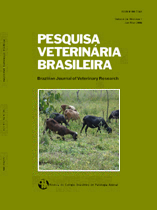 |
|
|
|
Year 2011 - Volume 31, Number 8
|

|
Microbiological and molecular evaluation of articulares and peri-articulares fluids of pigs, 31(8):667-671
|
ABSTRACT.- Faria A.C.S, Oliveira Filho J.X., Paula D.A.J., Brandão L.N.S., Nakazato N. & Dutra V. 2011. [Microbiological and molecular evaluation of articulares and peri-articulares fluids of pigs.] Avaliação microbiológica e molecular de líquidos articulares e peri-articulares de suínos. Pesquisa Veterinária Brasileira 31(8):667-671. Setor de Microbiologia Veterinária e Biologia Molecular Veterinária, Faculdade Medicina Veterinária, Universidade Federal de Mato Grosso, Av. Fernando Correia da Costa s/n, Cuiabá, MT 78060-900, Brazil. E-mail: valdutra@cpd.ufmt.br
In this study, 115 samples of articular and peri-articular liquid from swine with clinical suspected disease were collected from farrow (30.43%), nursery (44.35%) and growing-finishing (25.22%) phases of Intensive Pig Production Systems (IPPSs) for microbiological and molecular evaluation. A total of 57 (49.5%) samples was positive for at least one test. In bacterial isolation, 39.13% were positive, with highest frequency of Streptococcus spp. (19.72%), Arcanobacterium pyogenes (18.13%) and Escherichia coli (12.68%), and in some cases the fungus Candida sp. (2.6%). In the polymerase chain reaction test, 20% of the samples were positive mostly for Mycoplasma hyosinoviae (34.09%), Erysipelotrix tonsilarum (20.45%) and Haemophilus parasuis (15.90%). Almost all microorganisms were distributed over every growth phase, with a higher percentage of cases in the growing-finishing phase (69%). Streptococcus spp. were the principal microorganisms detected and were frequent in all phases. M. hyosinoviae was predomiant in the nursery phase. In the growing-finishing phase, A. pyogenes, H. parasuis and E. tonsilarum were predominant. About half of the cases were negative, what probably indicates degenerative processes like osteochondrosis; however articular and peri-articular infections still represent great economic losses with more or less impact depending on the growing phase of the pigs. Articular and peri-articular infectious problems were found in all herds analyzed. M. hyosinoviae mainly in nursery phase, however associated with degenerative processes, could not be excluded. |
| |
|
|
| |
|
 |